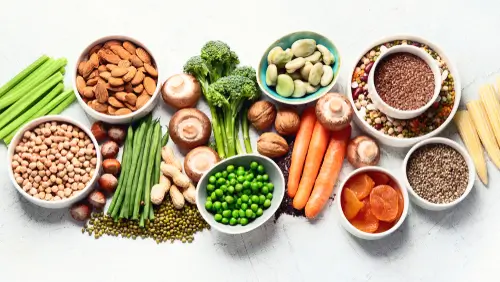Making the decision to enter recovery takes bravery. You’ve decided to start a new, healthy life. Part of getting sober means good nutrition in early recovery. It helps heal the body and mind from the damage done during addiction. Learning about a healthy diet and what foods you need pays off. It helps reduce the stress that comes with being new to recovery. As well, you build body strength and energy.
Good nutrition also supports positive thinking. This aids a great deal in staying sober. When you abuse drugs or alcohol, your body pays the price. It works hard trying to rid itself of toxins built up during addiction. These toxins can cause damage to your organs. We help teach good nutrition to all. Our nutritionists and medical experts find out what you need. From there, we work as a team to improve your nutritional health.

How Nutrition Affects the Body
Addiction blocks the benefits of good foods needed by the body. This can result in organ damage. In some cases, the damage can’t be reversed. However, nutrition in early recovery can help heal the damage done. Addiction blocks the absorption of nutrients in foods. Chronic digestive problems can result from this. Good nutrition can help heal the body. The mind can also improve with healthy eatingthe importance of.
Learning how eating healthy affects the body is good for anyone. Nutrition in early recovery can cause good health effects. It can cause relief from physical symptoms of poor nutrition. These can include:
- Headaches
- Feeling short of breath
- Lethargy
- Anemia
- Neurological damage
- Pain while eating
How Substance Abuse Disrupts Nutrition
Food contains nutrients that feed both the body and mind. They help build a strong body. They also help create a positive and clear frame of mind. Addiction keeps the body from absorbing the vitamins, nutrients, and building blocks it needs to stay healthy. Nutrition in early recovery is good for two reasons. For one, it helps repair the damage done to the body and mind during addiction. Second, it stops more damage from happening.
Alcohol and Nutrition
Abusing alcohol can damage the gastrointestinal tract. This causes nutrients not to be absorbed. The body uses up energy at a quicker rate. As well, drinking too much can cause vomiting and diarrhea. This causes a loss of vital nutrients. The pancreas and the liver are two major body organs. Alcohol abuse directly affects them. Nutrition in early recovery can help reverse the effects of damage to these organs.
Opioids and Nutrition
Nutrition in early recovery teaches how to eat balanced meals. Abusing opioids can cause disordered eating. The lack of fruits and vegetables in the opioid addict can cause several side effects. These include constipation and the lack of absorbing nutrients. Eating healthy can help reverse this damage.
Marijuana and Nutrition
Marijuana often causes an increase in appetite. As a result, many people turn to food that is easy to obtain. This often means unhealthy food. Many people crave food high in saturated fats, sugar, and salt. In turn, they often develop high cholesterol. This can lead to heart disease and diabetes.
Stimulants and Nutrition
Stimulants cause a suppression of the appetite. This makes the user believe they aren’t hungry. Then, they are less likely to eat the healthy foods they need. Nutrition in early recovery can reverse many conditions. These include muscle wasting and lack of focus. It can also reduce confusion, depression, and anxiety.

The Importance of Nutrition in Early Recovery
Proper nutrition is essential for individuals in early addiction recovery as food acts as a fuel that impacts the way the brain and body function, and an imbalanced diet can result in chemical imbalances that exacerbate anxiety, irritability, and stress, while a balanced diet with nutrient-dense foods can promote positive thinking and provide energy for the recovery process. Healthy eating habits and proper nutrients include:
- Protein: Helps repair and build tissues in the body, which can be damaged during addiction.
- Omega-3 fatty acids: Nuts, seeds, and algae all have healthy fats that can help reduce inflammation and improve brain function.
- B vitamins: Essential for healthy brain function, mood regulation, and energy production.
- Vitamin D: Important for bone health, immune system function, and mental health.
- Magnesium: Helps regulate stress levels and promotes relaxation.
- Zinc: Helps with immune function and supports brain health.
It’s important to remember that everyone’s nutritional needs are different, and it’s always best to consult a registered dietitian for personalized advice on nutrition during addiction recovery.
The Risks Of Poor Nutrition During Recovery
- Weakened immune system: Malnutrition can weaken the immune system, making individuals more prone to infections and illnesses.
- Increased risk of relapse: Nutritional deficiencies can cause physical and emotional discomfort, making individuals more vulnerable to relapse.
- Mental health issues: Poor nutrition can exacerbate mental health issues, such as depression, anxiety, and irritability, which are already common during the recovery process.
- Lack of energy: Nutritional deficiencies can cause fatigue and lack of energy, which can interfere with an individual’s ability to participate in therapy and other recovery activities.
- Physical health problems: Nutritional deficiencies can lead to physical health problems such as anemia, osteoporosis, and gastrointestinal issues.

Difference Between A Balanced Diet & Diet For Recovery
A balanced diet is a healthy way of eating that includes a variety of foods from all food groups in appropriate portions to meet daily nutritional needs. On the other hand, a diet for recovery is a dietary plan specifically designed to support the recovery process from a health condition or addiction, often with a focus on nutrient-dense foods that can help repair the body, improve brain function, and stabilize mood. While a balanced diet is beneficial for overall health, a diet for recovery may have more specific dietary restrictions or recommendations based on an individual’s needs and treatment plan.
Top Foods for Addiction Recovery
Education in nutrition is a positive and healthy choice for anyone. However, it proves really important for those in recovery from addiction. Planning a balanced diet takes know-how. It can begin the body’s healing process caused by the effects of addiction. This includes getting the right vitamins and minerals. Along with that, people carbs, proteins, and fatty acids. Additionally, people should stay hydrated. Good nutrition in early recovery should include the following items:
- Foods low in fat and salt
- High fiber foods and grains
- Small amounts of caffeine and sugar
- Vitamin and mineral supplements
- Proteins like lean meats, fish, and poultry
- Bananas
- Vegetables
- Yogurt and Tofu

Other Common Mistakes Made During Addiction Recovery
Here are a few other common mistakes people may make during addiction recovery.
- Not seeking professional help or trying to recover alone.
- Ignoring co-occurring mental health issues.
- Focusing only on abstinence and not addressing underlying issues.
- Being overconfident and not taking the necessary precautions to avoid relapse.
- Neglecting self-care, such as sleep, exercise, and healthy eating.
- Surrounding oneself with triggers and negative influences.
- Losing sight of the progress made and becoming complacent.
- Being too hard on oneself and feeling guilty or ashamed of past behavior.
Nutrition in Early Recovery for the Los Angeles Area
Are you interested in learning about nutrition in early recovery? Eating a balanced diet plan during recovery pays off. We discuss your unique needs and come up with a plan for success. Our wise nutritionists know how to support good nutrition as part of recovery. Launch Centers in Los Angeles can help you recover from addiction. Additionally, we can teach you to eat healthy. As a result, you will enjoy overall good health. Contact us now to get started. Learn how to be sober and eat the right diet for your needs.





